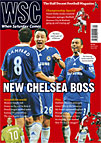 Enrico Preziosi has faced bankruptcy and a match-fixing conviction, but Paul Virgo finds he’s still a hero to Genoa fans
Enrico Preziosi has faced bankruptcy and a match-fixing conviction, but Paul Virgo finds he’s still a hero to Genoa fans
For someone supposedly banned from professional football, Enrico Preziosi is not doing too badly as chairman of Genoa. This season Italy’s oldest club have outshone Sampdoria, something of a rare occurrence since their upstart neighbours formed in 1946, and at the time of writing they were challenging AS Roma and Fiorentina for Serie A’s final Champions League slot.
“At this point we believe we can finish fourth. We’re no inferior to the other pretenders,” Preziosi said after a 1-0 win at Napoli in February. The 61-year-old, who has made his millions with the Giochi Preziosi toy company, is understandably pleased to have restored the nine-time champions to the upper reaches of the Italian game.
It has been an eventful ride though, involving, among other things, relegation to the third tier for match-fixing and two criminal convictions. He took over the sleeping giants in 2003 when they were on verge of bankruptcy and had been relegated from Serie B, although they were saved from the drop by a legal challenge by also-demoted Catania that forced the second division to be temporarily enlarged to 24 teams.
Preziosi subsequently found himself under investigation for fraudulent bankruptcy when Como, the minnows he had taken from the lower leagues to a season in the top flight in 2002-03, went to the wall two years later, after he had allegedly stripped their assets by taking players to Genoa at below the market price. He protested his innocence but then struck a deal to end the case by accepting a 23-month jail sentence in 2008, knowing that he would not have to serve it because of a 2006 pardon law to combat prison overcrowding.
In the meantime, Preziosi had got himself into more hot water at his new club. Genoa won promotion to Serie A in June 2005 with a 3-2 victory over already-relegated Venezia on the last day of the season. Celebrations turned sour days later when police stopped a Venezia director driving from Genoa’s offices with a bag containing €250,000 (£167,000). The clubs said the money was down-payment on a transfer. Wiretaps investigators had gathered suggested otherwise and Genoa were found guilty of match-fixing by an Italian Football Federation tribunal. Fans staged violent protests and Preziosi appealed that he had not been given due process, presenting evidence on computer files he said demonstrated the sporting tribunal had written its sentence before the case had even been heard. But this time there was no escape and they were sent down to the third tier.
Preziosi promised fans “not to give up” and was good to his word, steering Genoa back to Serie A for first time in 13 years with two consecutive promotion campaigns. After finding their top-flight feet with a solid tenth-place finish last season, his shrewd transfer market dealings have enabled them to aim even higher this term.
The hero is Diego Milito, a classy Argentine striker who spurned an offer from Spurs in the summer to return from Real Zaragoza to the club he had left amid the match-fixing furore. The signing of Thiago Motta, a Brazilian midfielder formerly of Barcelona who was picked up as a free agent in September after being let go by Atletico Madrid, has turned out to be another inspired move.
All this has taken place despite Preziosi being given a five-year ban from the game for the Venezia scam, along with a suspended four-month jail term for sporting fraud (which he is appealing even though he did not serve it due to the pardon law).
Fortunately for him, in Italy the workings of justice are full of anomalies. One is that being banned from football does not stop you owning or being chairman of a club. There are limits on which parts of the ground he can enter on match days and he cannot represent the club at federation meetings or take direct part in its transfer negotiations (he was given a two-month penalty to add to his five-year ban for holding talks with Juventus officials over bringing defender Domenico Criscito back from Turin in the close season). However, he can easily dodge the restrictions by using dogsbodies. Basically, the ban is a joke or, as a club spokesman described it, “above all a moral punishment”.
As is to be expected, the toy entrepreneur sparks strong reactions. I dare say he’s not too popular in Como and former Genoa coach Franco Scoglio died of heart attack in 2005 after a heated row with him during a TV call-in show. But many think he is not such a bad egg. He seems to have Genoa’s long-term interests at heart not just personal glory. He gifted a 25 per cent stake in the club to a foundation tasked with conserving their heritage and running a museum on their history. And if the success continues, supporters who have had little to cheer since the 1930s are hardly likely to turn up their noses. Whether Preziosi should be allowed to orchestrate it is another matter.
From WSC 266 April 2009